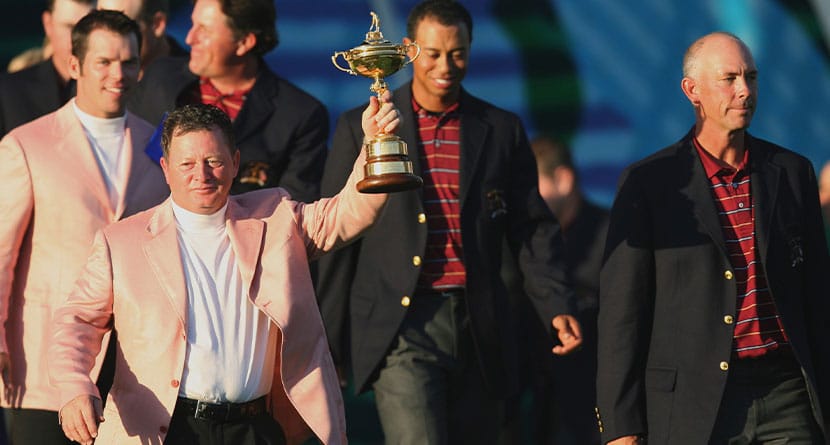GUIDONIA MONTECELIO, Italy (AP) — What must have seemed like a long time to the Americans back then surely doesn’t now. They beat Europe on its home turf at The Belfry in 1993, winning the Ryder Cup back to back for the first time in a whopping 10 years.
Turns out that wasn’t the end of Europe’s run. It was only the start.
The Americans now have gone 30 years without winning the Ryder Cup away from home, a losing streak the entire team knows all too well. Never mind that five players on the U.S. team that arrived Monday in Italy were not even born when Team USA last won in Europe.
“It’s not really at the forefront of the messaging,” said U.S. captain Zach Johnson, who has played on three of those losing team in Ireland, Wales and Scotland. “The obvious bullet points don’t need to be mentioned, and that’s one of them.”
The context of this losing streak can be presented in so many ways. Half of Europe’s 12-man team wasn’t born when the American last celebrated away from home. Deane Beman was commissioner of the PGA Tour. Tiger Woods was a senior in high school.
And then there was this from NBC lead announcer Dan Hicks, noting that Raymond Floyd was the oldest player on that 1993 team at The Belfry.
“He’s now 81, and he hasn’t seen a U.S. team win overseas since then,” Hicks said.
It hasn’t been from a lack of ability. Those six consecutive road losses featured 12-man combinations of 41 players, 26 of whom went on to combine for 57 major championships.
The losing streak began in Spain in 1997, the year Tiger Woods won the Masters by 12 shots and captivated the entire sports world. Justin Leonard won the British Open and Davis Love III won the PGA Championship that year. They combined to go 1-9-3 at Valderrama.
Woods played on five losing road teams. Phil Mickelson was there for all six losses during the losing streak. He was beaten by Phillip Price, the No. 119 player in the world, in a one-point loss at The Belfry in 2002.
Why does it keep happening? For starters, Europe is very good.
“You can’t dispute the clutch plays that they make at the right time,” said Paul Azinger, who played on that ’93 team and now is the lead analyst for NBC.
And there is no denying the value of volume from a home crowd, the serenade of “Ole, ole, ole, ole” that can be as inspiring as a scoreboard filled with European blue.
It’s what prompted Rory McIlroy to say, “I think one of the greatest accomplishments in our game now is to win an away Ryder Cup.”
McIlroy believes fans understand the value of a home crowd.
“I don’t know if they appreciate the value of a home golf course,” he said. “It’s like chalk and cheese the way a U.S. Ryder Cup golf course is set up compared with a European course. I contrast Hazeltine in 2016 to France in 2018. You could hit it anywhere at Hazeltine — Medinah (2012) was not much different.
“I feel like in Europe, it’s more a war of attrition in terms of who doesn’t make mistakes, whereas in America, it’s who can make the most birdies.”
The 30-year drought seems worse because the Ryder Cup is every other year. Losing six in a row doesn’t sound as dire as going 30 years since the last win. Both are true. Jordan Spieth prefers to point out that Europe has won only once on American soil the last 15 years.
Still, it’s a streak that has become a focal point.
“Given the amount of great American players, individually, you’d think collectively they’d have gotten it done over there at some point in 30 years,” Spieth said. He has played on two losing road teams, in Scotland and France.
There have been a few close calls — a one-point loss at Valderrama in 1997 and at Wales in 2010, and The Belfry in 2002 probably would have been another except that Sergio Garcia was making snow angels in a bunker when Europe clinched and the last two matches walked in and agreed to a halve.
Azinger always felt as though Europe, even if it is not the favorite on paper, shows up with enough of an edge to make a difference.
“Europe shows up with a 1% advantage,” Azinger said. “I would compare it to being in Vegas. There’s only a 1% advantage in blackjack, but they’re building some pretty nice hotels on it.”
Johnson has said what other U.S. captains have mentioned going on the road. This is a new team. These are old memories. It still hasn’t changed anything.
Only four players on this American team have played a Ryder Cup on the road — Rickie Fowler three times, Jordan Spieth twice and Justin Thomas and Brooks Koepka.
“Ignorance is bliss,” said Scottie Scheffler, the No. 1 player in the world competing in his first Ryder Cup on the road.
Tommy Fleetwood of England wonders if enough attention is paid to the quality of players on Team Europe, even after the era of the “Big Five” of Nick Faldo, Seve Ballesteros, Sandy Lyle, Bernhard Langer and Ian Woosnam.
Europe could claim only one major — Paul Lawrie at Carnoustie in 1999 — during a 10-year stretch that added to the perception the Americans were favorite. But then, the Ryder Cup is not about winning majors.
“Europe obviously has an amazing identity with the Ryder Cup,” Fleetwood said. “I don’t know if anyone can put their finger on why it’s been such a long time. I always feel like they’re both strong teams. Home advantage does play a part.
“I don’t want to look too much into it,” he said. “I just want to win this one.”




